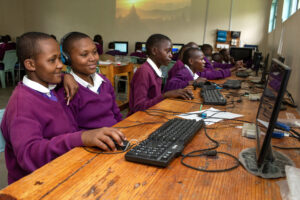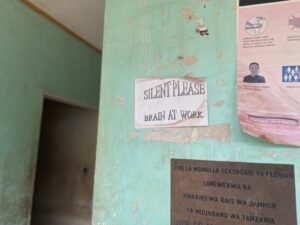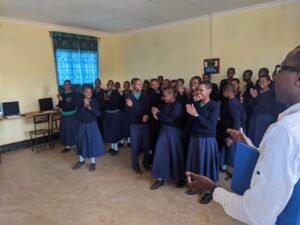Hello Friends of Powering Potential,
 |
| Left to right: Ena Haines, Dana Rensi |
We were based in Iquitos, the regional capital, which is a city of nearly half a million, the fifth largest in Peru. It is the largest city in the world which cannot be reached via road, and is the gateway to the many communities of varying sizes along the Amazon and its tributaries.
Project Amazonas (https://www.projectamazonas.org/) is a non-profit which has been active in the area since the mid-1990’s, with its medical boat bringing healthcare to remote areas, and field stations dedicated to preservation and reforestation in the jungle. They have a successful volunteer program to bring skilled volunteers as well as high school students to work there. Dana invited three local educators and a technology student from Iquitos to travel with us to Santa Cruz, the site of a Project Amazonas (PA) Forest Reserve. At the village by the river of about 100 families we were shown its three schools: the primary school for 95 students, the community center that is used for secondary school for 40 students, and a small kindergarten building.
 |
| Exterior of the 95-student primary school |
 |
| Interior of the 95-student primary school |
 |
| Community Center / Secondary School |
PA has led a volunteer effort over the last two years to construct a dining pavilion that is to be turned over to the community this month (August, 2017). The state provides breakfast food for primary school students, which in Santa Cruz is shared among all of the students, and therefore runs out by the third week of each month. PA plans to find additional food aid to cover the gap. The local population does have food sources, e.g. fish, although clean drinking water and balanced nutrition are challenges.
Don Dean, a science teacher and musician from New Jersey who heads the PA Santa Cruz Forest Reserve, has led the effort with the community, providing educational enrichment for students at the field station and installing solar power for the schools, in addition to building the dining hall. He was very glad to receive Dana’s gift of a Raspberry Pi loaded with the Spanish version of RACHEL configured as a wi-fi hotspot and server. He and his local assistant will use it with the children at the field station, and would like to place additional Pi’s with RACHEL in the primary and secondary schools. After spending the night in the field station camp, we traveled back as we had come via two rivers and an overland transfer between them, to the CONAPAC (Conservacion de la Naturaleza del Peru, A.C., http://conapac.org/) Amazon Library. It serves young people aged 6 to 20 with educational enrichment including reading, English, and music lessons, crafts and games. Children come after school on a regular basis from 8 nearby schools, with some outreach to another 45 river schools as well. CONAPAC was founded by leaders of Explorama Lodges in 1990 and has a long history of projects including building community drinking water filtration facilities as well as supporting local schools with school supplies and teacher professional development and leadership training. The teachers on our trip did a lot of brainstorming on creating local content for the students in the rural areas. They feel strongly that the educational material should be based on the local environment, in which the river and the forest are the major features. The government assigns teachers to the schools, but these are viewed as hardship posts and retention is a problem, as is teaching some subjects, such as science and English. The educators at the sites and in our traveling group have all been impressed with RACHEL, but the idea of adding local content is of great interest to the school and University people traveling with us from Iquitos.
We spent a morning with several dedicated faculty at UNAP, the Universidad Nacional Amazonia Peruana in Iquitos. A few of them had experience working with secondary schools in poor areas near Iquitos. In addition to communities along the rivers, there are about 52 rural schools along the highway (carretera) which have similar challenges. There have been efforts to provide solar power and computers, but we didn’t hear about much success. For example, one faculty member described a school where he works where the government had solar equipment delivered with no support for installation. The school has unsuccessfully sought government as well as NGO support for installing the equipment. We were told that the parents are very interested in computer training, but sometimes the teachers don’t see the value and don’t want to get involved.
 |
| Dana Rensi and Ena Haines on the Nauta River with educators from Iquitos |
There was a lot of discussion about bringing teachers from the region for training in Iquitos when school is out in January and February. Meals would need to be provided, but most people would be likely to be able to stay at home or with relatives. Some suggested that the teachers would be motivated by earning a certificate recognized by the education authority.
I came away impressed by the dedication and creative energy displayed by these educators. They have been involved with poor schools, and were interested in being involved. We had heard about three specific schools which had eager proponents of RACHEL.
 |
| Ena Haines and Dana Rensi brainstorming with UNAP faculty |
 |
| Dana Rensi introducing UNAP faculty to the RACHEL offline digital library |
Dana and I visited Rosa de America, the beautiful private school where she taught English as a Fulbright Exchange Teacher in 2005-6. It is bright and colorful, preparing to celebrate its 25th anniversary, with new buildings and plans for continued expansion. The students and teachers, all in uniform, greeted us warmly. We met with the Director along with Cledy Grandez Veintemilla, the science teacher who has remained a close friend of Dana’s, who had been on our trip to Santa Cruz. Dana and Cledy demonstrated RACHEL to the Director, who was very impressed with it, even though they do have textbooks and impressive educational resources. They will use it in their computer lab.
Twice each year, Cledy brings students from Rosa de America to visit a public school in Belén, a poor district on the outskirts of Iquitos. The school, like its surrounding community, is built on stilts because of the flooding during the rainy season. Although the school was closed for two weeks of vacation, the principal was glad to meet us there and show us around. She is in the middle of a three-year assignment to the school, and has made enormous progress against challenging problems. For example, the school had been closing for weeks at a time because its roof didn’t keep out torrential rains, but she managed to get the government to replace it.
 |
| Dana Rensi with science teacher Cledy Grandez Veintemilla, in Cledy’s classroom |
She also managed to get the building cleaned, and developed a school tradition in which the students now keep it clean. She has reached out to the community to send their children to school. The enrollment is so large that they use the classrooms for primary grades in the morning and secondary grades in the afternoon. They do have electricity, although we did not find out whether it is any more adequate than the furniture, which does not accommodate all of the students. They have five laptop computers that work and a good technology teacher, although he, too, is there on a three-year assignment. Dana promised the principal that Cledy would return with a RACHEL Pi for them to keep. Between Cledy and a good technology teacher, it seems as though it should be successfully deployed.
 |
| From right: Dana Rensi, Ena Haines, and Cledy Grandez Vaintemilla |
As I left, Dana was in the process of arranging meetings with the regional education authority (DREL) and the Instituto de Investigaciones de la Amazonía Peruana (IIAP), a government institute created in 1980 which “offers various services to society, mainly related to research and specialized studies of Amazon natural resources, training and technology transfer.”
Thanks to Dana’s leadership, we accomplished our goal of learning about possible projects. Next steps include learning of the interests and possibilities with DREL, IIAP, and additional schools, which she has under way. Then we can develop a couple of specific proposals from the ideas for technology installations, teacher development, and content development that arose.

Spanish is the language of Peru. The following translated Spanish proverbs are another taste of South American culture.
Fortune and olives are alike: sometimes a man has an abundance and other times not any.
From the tree of silence hands the fruit of tranquility.




No comment yet, add your voice below!